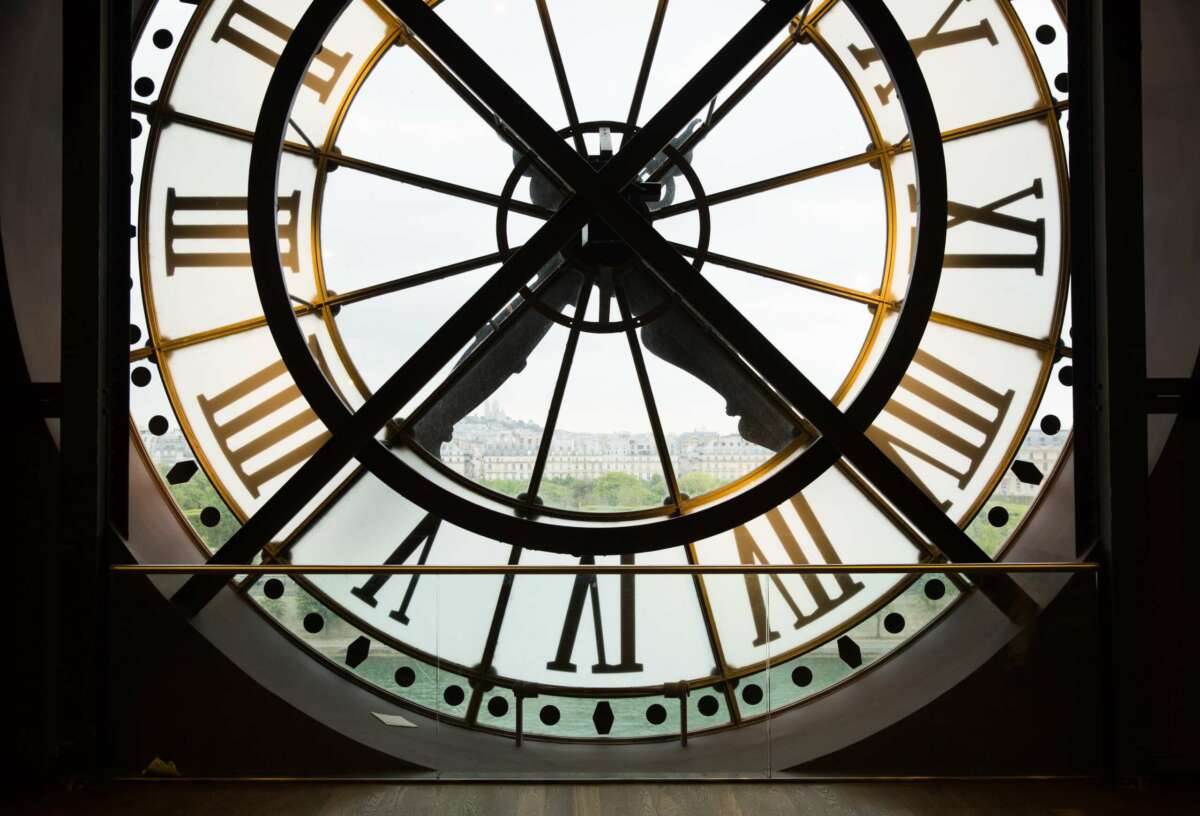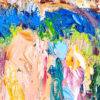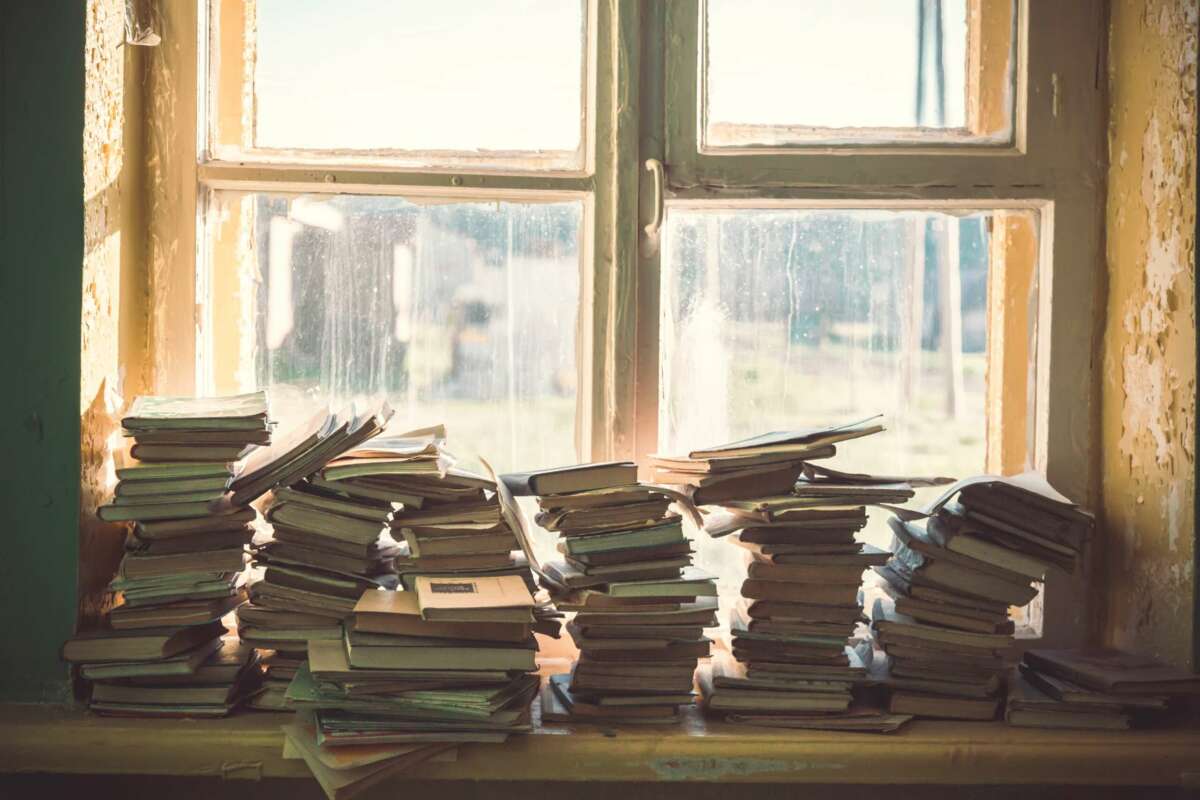Certain occasions, like New Year’s Eve and birthdays, make us focus more than we usually would on the idea of clocks and the nature of time. Which got us to thinking: what are the most famous paintings and other works of art in the world about clocks and the passage of time? We did a bit of research, and found 14 world famous paintings and works of art featuring clocks, timepieces and somber meditations on the passage of time.
about time fashion exhibit at the Met
The 2020 Costume Institute show at the Metropolitan Museum of Art in New York City had as its theme the concept of time. The museum noted that “About Time: Fashion and Duration” was inspired in part by the novels of Virginia Woolf, including “The Hours.” Historic clocks ticked the minutes away as visitors perused the show.
The exhibit was ingenious in provoking thought about our conceptions of time, adornment, beauty and structure.
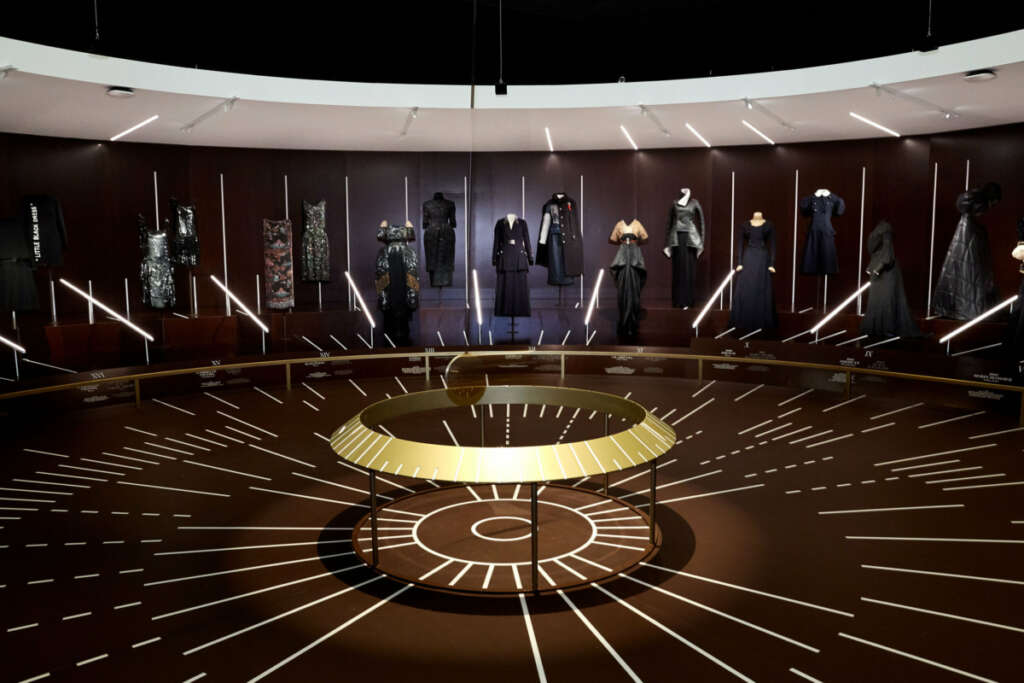
Credit: Masato Onoda/WWD
And all of the discussion about fashion and time got us thinking. What are the most famous clocks in the world of the visual arts? What can art show us about keeping time and how that process affects our spirit? After making a pilgrimage to the high temple of art to meditate on the meaning of time, we wanted to go further.
what uses have artists had for clocks and timepieces?
a meditation on mortality
Within a clock, a watch or any timepiece, there are many potential stories and messages. The most obvious one is a comment on mortality, the potential preciousness of each passing hour, and the value of living in the moment.
a way to question authority
A provocative work involving a clock can also be subversive, reminding us that the systems we invent to make sense of our lives and the world are not infallible. For example, if a clock or a watch tells us one thing, but we know that actual reality is something else, are we comfortable challenging it. Or do we just ignore it?
Some works about clocks and timepieces remind us of the oppressive tyranny of the clock at work and in our leisure time, and the toll that rigid timekeeping can take on the human spirit.
a symbol of harmony
It might not be the first word that comes to mind when the word “clock” is mentioned, but some artists have deployed them as objects symbolizing love. Synchronicity between two or more clocks can represent passionate souls in perfect rhythm. Or even a universal condition uniting all nations across barriers of language and culture.
a call for critical thinking
Finally, a work of art with a clock or a watch can provoke into seeing the world with a fresh perspective. What happens when an artist takes a classic clock face and morphs it in some way? Does it enable us to see more clearly? Or just annoy or confuse us?
If you’re equally curious about all of these timely matters, dear reader, come along. Here are 14 world famous, provocative and beautiful paintings and works of art with clocks and timepieces that foster meditation on the passage of time.
14 famous paintings and works of art about clocks, timepieces and the passage of time
1. The Persistence of Memory (1931) – Salvador Dali
Spanish artist Salvador Dali is one of the most influential painters of the twentieth century. Dali’s most famous work may be The Persistence of Memory (1931), often called just “Clocks” and widely regarded as a Surrealist masterpiece.
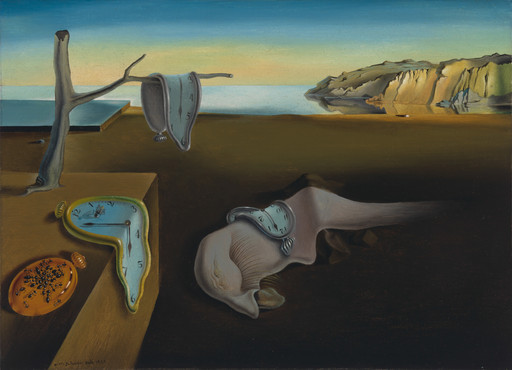
Famous paintings and works of art about clocks, timepieces and the passage of time: The Persistence of Memory (1931) – Salvador Dali. Photo Courtesy: MoMA.
In the work, several timepieces have melted and taken on odd shapes – they resemble deflated balloons, as if time itself has been defeated or lost all meaning. It is said that that they signify the artist’s personal interpretation of time as “soft” or “hard.” The mysterious figure that appears to be sleeping underneath one of the clocks is thought to symbolize the skewed passage of time that occurs in one’s dreams.
It makes us think of what happens when time has run out.
2. The Clock (2010) – Christian Marclay
Christian Marclay, a Swiss multimedia artist, is probably still best known for his iconic video work “The Clock.” The piece won the Venice Biennale’s Golden Lion award in 2011, and has since been displayed at museums in New York, London and around the world.
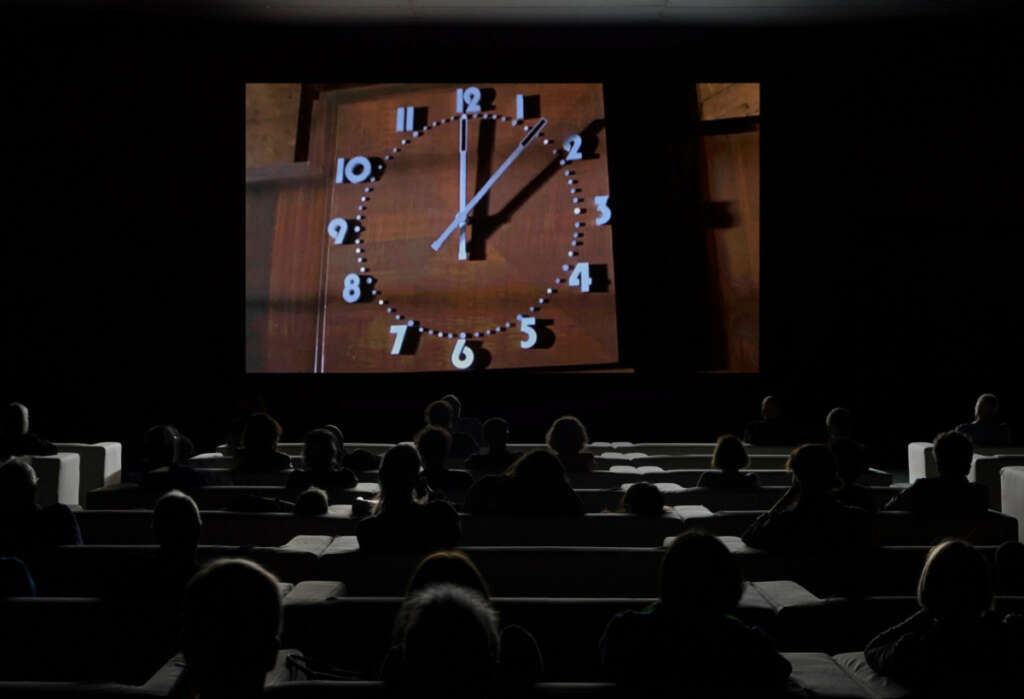
Famous paintings and works of art about clocks, timepieces and the passage of time. The Clock (2010), Christian Marclay. Photo Credit: The New York Times.
The immersive work runs for a full 24 hours, with film clips arranged to show the precise time throughout the cycle. People who have seen it say that extended viewing causes the visitor to lose all track of time. Which is perhaps the point.
3. National Times (2016) – Agustina Woodgate
If further proof is needed that clocks and instruments of keeping time are timelessly interesting to artists, part of Agustina Woodgate’s work National Times was featured on the promotional poster for the 2019 Whitney Biennial.
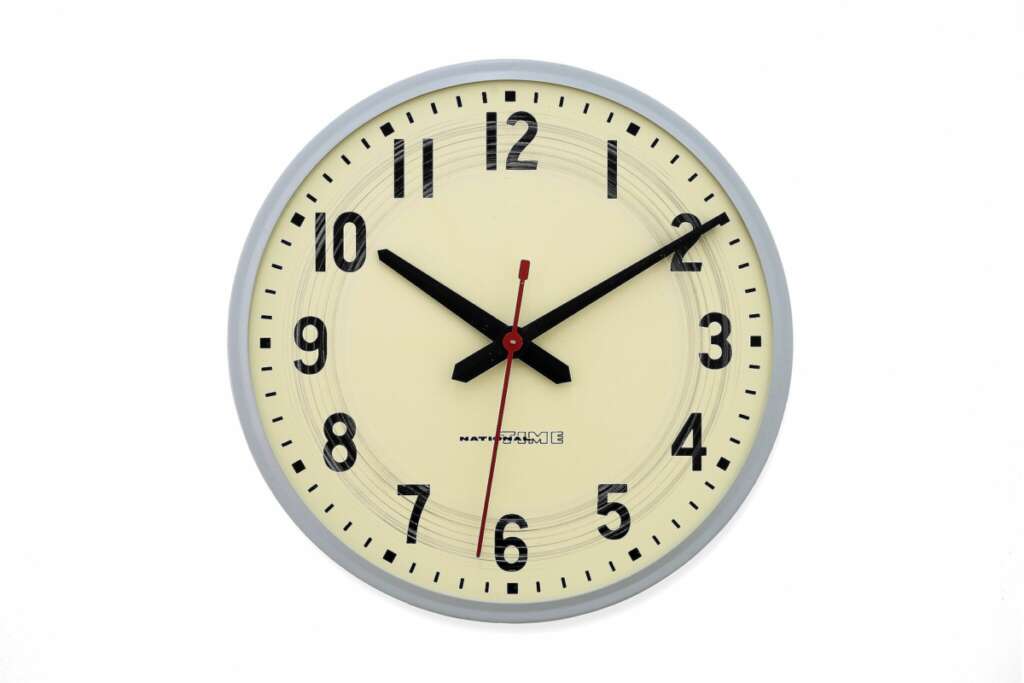
Famous paintings and works of art about clocks, timepieces and the passage of time. National Time (2016) Agustina Woodgate. Photo Credit: The Whitney Museum.
The 38-year-old Argentinian artist meditates on power and labor dynamics in the installation. Composed of a row of clocks arrayed along a wall, the piece stays synchronized due to its master/slave configuration.
One digital clock, not visible, controls all of the analog timepieces that we see. The hour and minute hands of each clock are outfitted with sandpaper, slowly shaving off the numbers from the faces as they continue to cycle through each day, eroding their function. Perhaps as a commentary on how mindless work can destroy the soul of the worker?
4. Allegory of Vanity – Antonio de Pereda
Antonio de Perada’s famous painting depicts several representations of the passage of time in one of the earliest iconic works that feature clocks and timepieces.
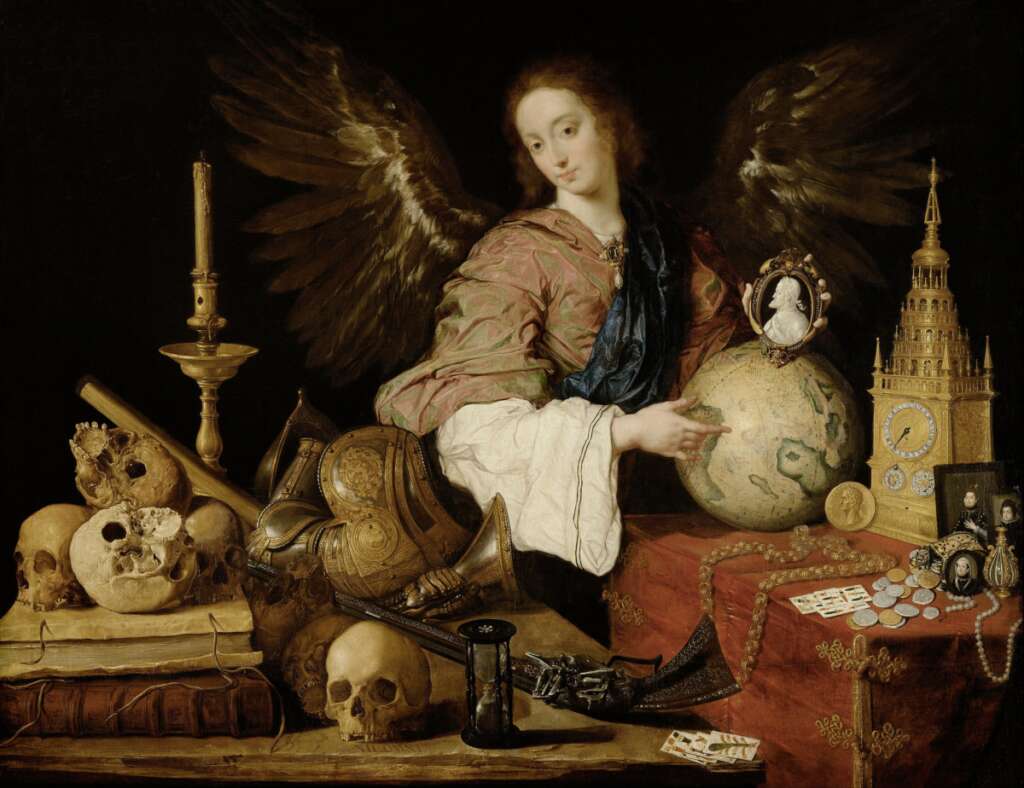
Allegory of Vanity – Antonio de Pereda
The work depicts a clock, an hourglass, old photographs, a blown out candle, skulls and a globe — a nod to the literal turning of the Earth and the passage of time.
5. Untitled (Perfect Lovers) 1991 – Felix Gonzalez-Torres
Currently on view at the Museum of Modern Art (MoMA) in New York, Untitled is dedicated to Gonzalez-Torres’s deceased lover, Ross Laycock, who died of an AIDS-related illness in 1991. Two store-bought clocks hang side by side, clicking along in unison; if one battery begins to run down or eventually dies, the artist requests that its batteries be replaced.
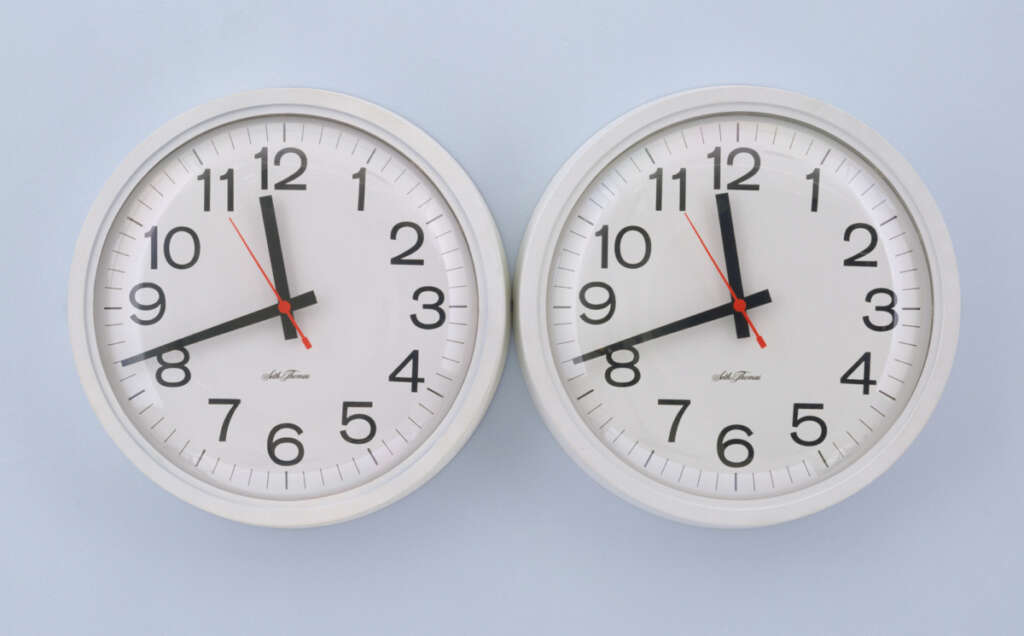
Untitled (Perfect Lovers) 1991- Felix Gonzalez-Torres
Poignantly, the two clocks are touching each other, to mark the union of artist and lover.
6. Against the Run (2015) – Alicja Kwade
Though it might appear at first to be a typical Manhattan public clock, with the the same nineteenth-century design typically found all over the city, this work subverts traditional notions of time. The numbers on Alicja Kwade’s clock in Against the Run are rotated about 90 degrees clockwise. And the hands rotate backward. Meanwhile, the second hand appears to stand still, pointing vertically at all times.
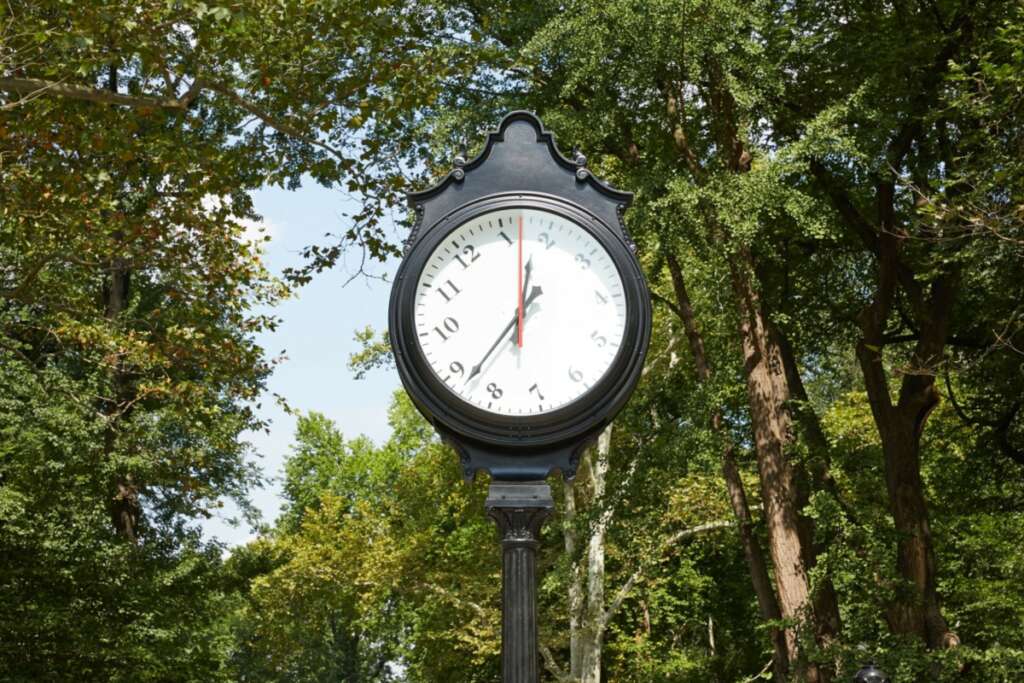
Against the Run (2015) – Alicja Kwade. Photo Credit: Public Art Fund.
The Public Art Fund, which sponsored the work, notes: “Our understanding of how a clock should run is second nature, making this variation almost impossible to read, even as it continues to tell the right time. This prompts us to see ‘reality’ from a new perspective.”
7. Escapement (2009) – Raqs Media Collective
New Delhi-based Raqs Media Collective’s installation Escapement takes its name from a horological mechanism. The work involves two dozen clocks—one for each time zone in the world.
The artists themselves note that Escapement functions a bit like the valves of a heart. While also pointing out that time exerts a kind of tyranny over us all.
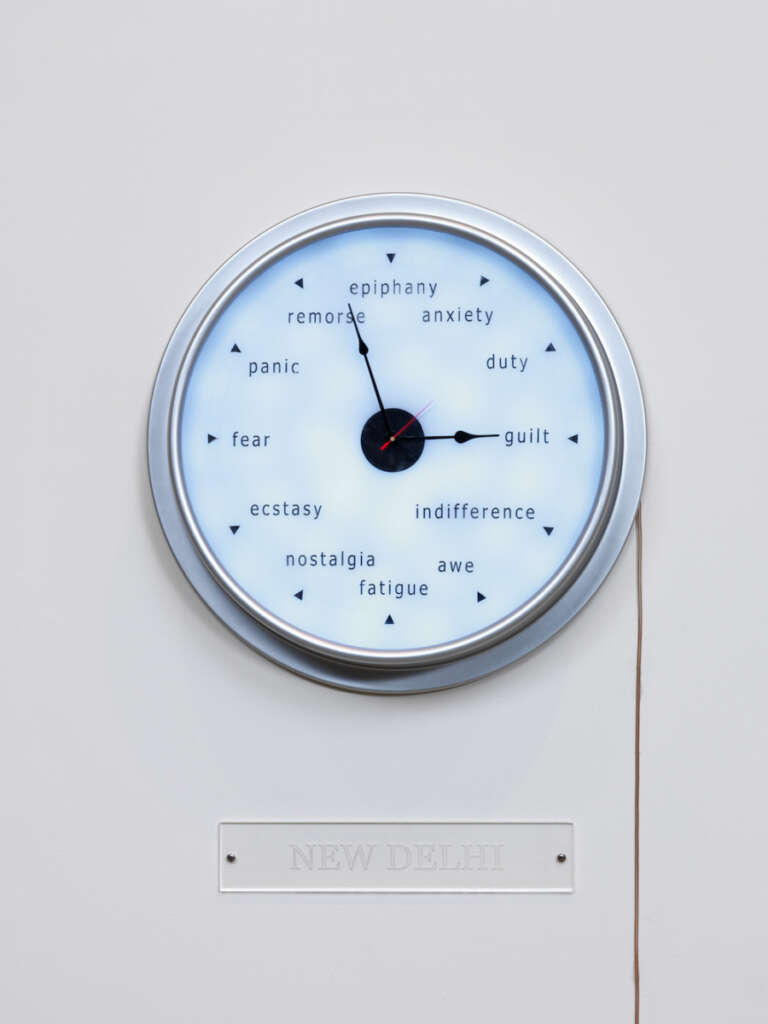
Escapement (2009) – Raqs Media Collective
Perhaps the most memorable element of this work is one of the 24 clocks that is unlike the rest. The clock that is on New Delhi time displays words instead of numbers. They’ve been chosen to evoke feelings and sensations – to suggest mood swings, emotional rhythms, and midnight epiphanies.
8. Portrait of a Man Holding a Watch (1643) – Frans Hals
Similar to Allegory of Vanity, the presence of a watch in Frans Hals’ portrait of an anonymous man is thought to indicate the inexorable march of time. The image of a watch in portraits of this era served as memento mori—reminders of mortality.
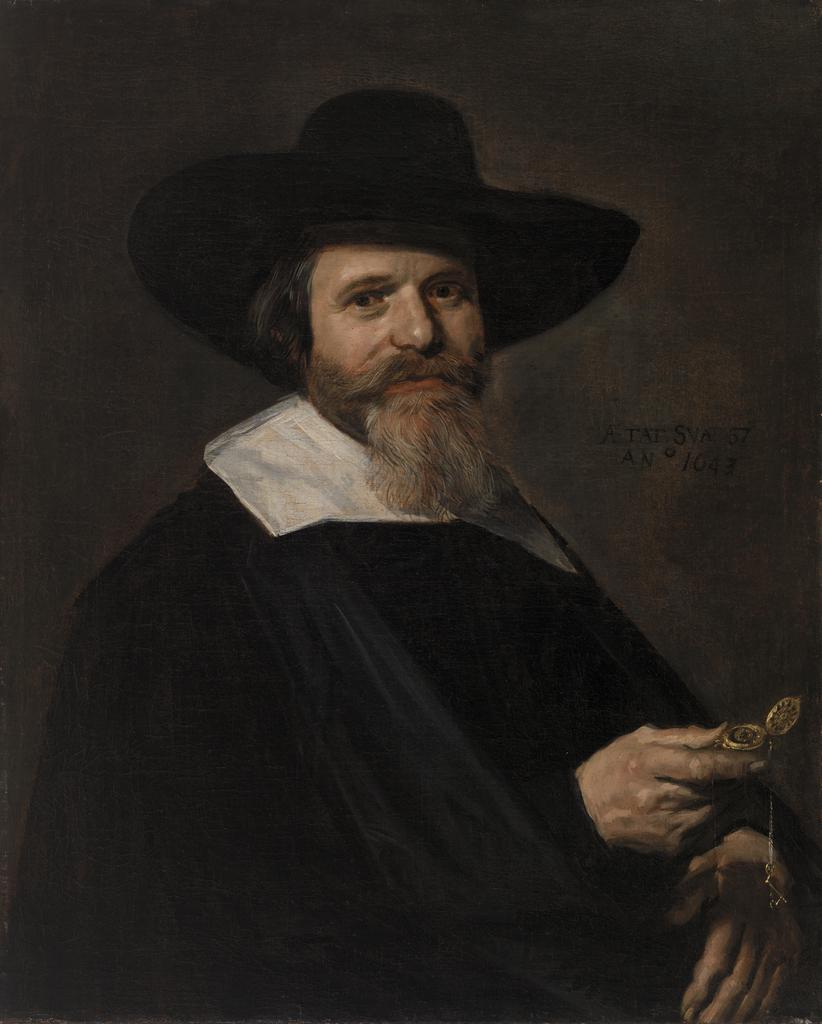
Portrait of a Man Holding a Watch (1643) – Frans Hals. Photo Credit: The Barnes Foundation.
9. Giving Time (2000) – John Menick
To create the subversive work Giving Time, New York-based artist and writer John Menick had a technician alter the works of a watch so that it would take exactly 28 hours to make a full rotation, even though the watch’s face is unchanged.
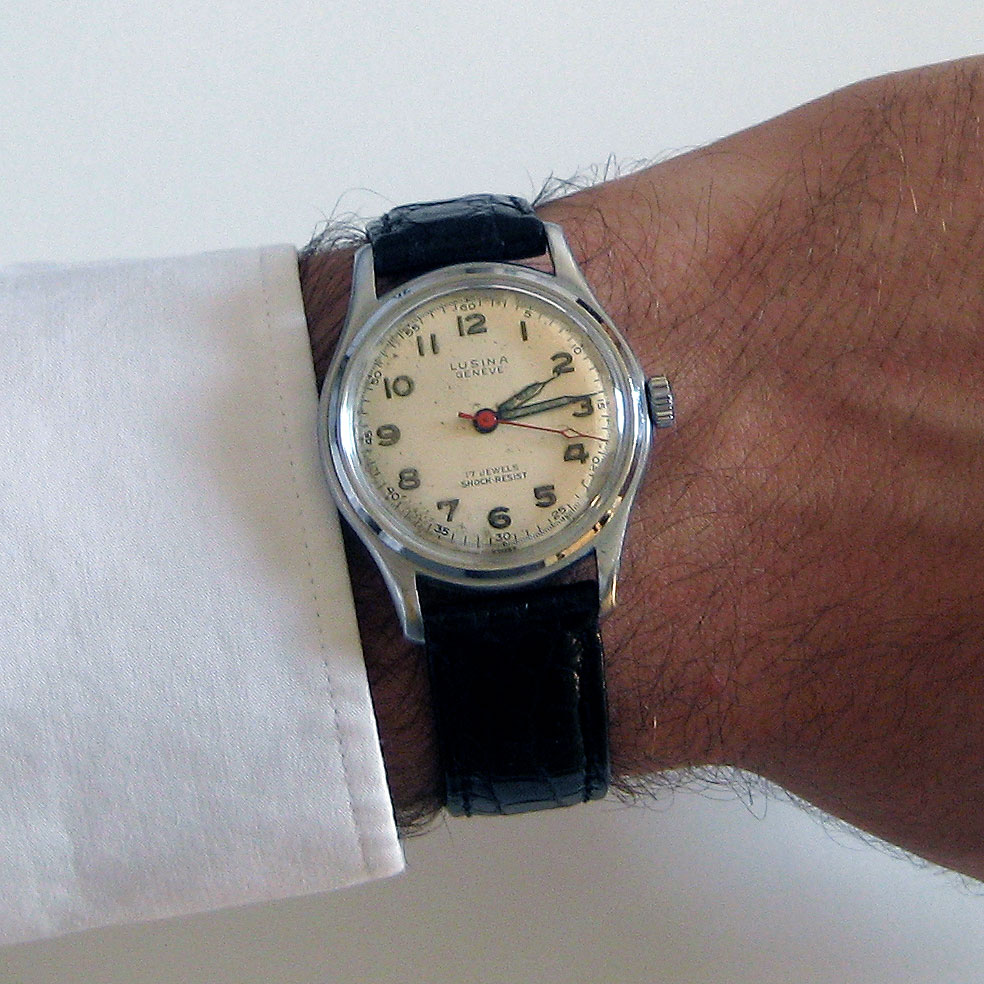
Giving Time (2000) – John Menick. Photo Courtesy the artist.
The work was inspired partly by the artist’s research into the history of standardized time. The concept being tested was that the recipient would live by the time dictated by the watch. For example, showing up at work when the watch said it was nine a.m. Even though they might be somewhat conscious of the fact that the watch was off. The wearer would gradually go out of phase with everyone else. And just as gradually return.
10. Two shakes, a tick and a jiffy (2009) – Julieta Aranda
In Two shakes, a tick and a jiffy, artist Julieta Aranda introduces the notion of decimal time. While the idea dates from the time of the French Revolution, it never quite caught on.

Two shakes, a tick and a jiffy (2009) – Julieta Aranda. Photo Courtesy the Guggenheim.
Which poses an interesting question: what if we all refused to adopt a certain method of keeping time? How much consensus is needed to enforce societal norms of timekeeping? Like Daylight Savings Time?
11. Clock of the Académie Française (1929) – André Kertész
To create this compelling image, photographer André Kertész tells the story of how he followed his natural curiosity and one day ventured into the cupola of Paris’ Académie Française.
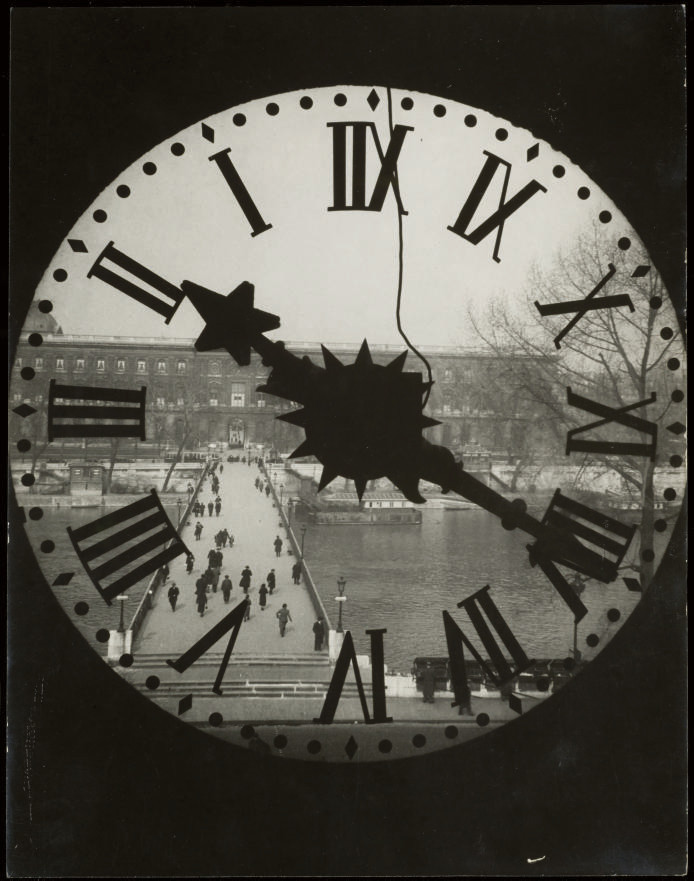
Clock of the Académie Française (1929) – André Kertész
According to the the Getty Museum, which now owns the piece, the artist wrote: “One day in 1932, I was standing in front of the Académie Française and decided to take a look at what was behind those massive gates. . . I ended up in the huge attic…the clock was under the cupola. Its glass face with Roman numerals gave me this fantastic view onto the Pont des Arts with the Louvre behind it.”
The Getty’s curator notes: “the clock’s silhouetted Roman numerals and hands appear to align with various elements of the scene below. The V points to the statue’s shadow. Roman numeral IIII highlights two pedestrians. The III rests atop magazine stands flanking the Seine. And the star shape on the clock’s hand blocks the far end of a bridge crossing the river.”
This is the clock as navigator, visual guide and highlighter. A novel use and meaning that only an artist was likely to uncover.
12. Homage to Apollinaire (1912) – Marc Chagall
Chagall’s work Homage to Apollinaire (1912) does not explicitly portray a clock. Yet many elements of this enigmatic work suggest a clock face.
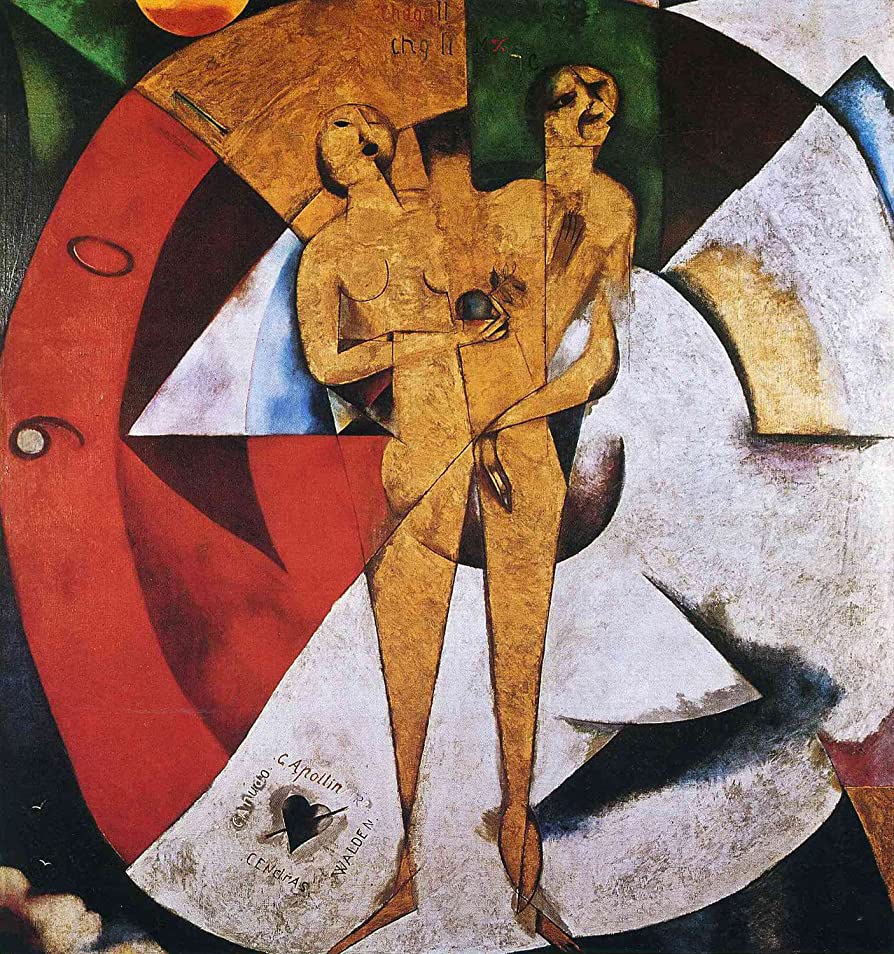
Homage to Apollinaire (1912) – Marc Chagall
The composition was motivated by Chagall’s admiration for the poet Guillaume Apollinaire, whose poetry often concerned with the clash between the modern and the traditional. The work portrays a man and a woman joined at the hip and surrounded by geometric shapes, the names of several poets and several numbers. The circle and numbers nod to clocks and other timepieces. And perhaps to the nature of love. Is it eternal or ephemeral? Or both?
13. The Black Marble Clock (1869) – Paul Cezanne
In the still life The Black Marble Clock, Cezanne showed his mastery of light and shadow. The jet-black ormolu clock casts a forbidding presence over the scene – rigid, uncompromising and stern.
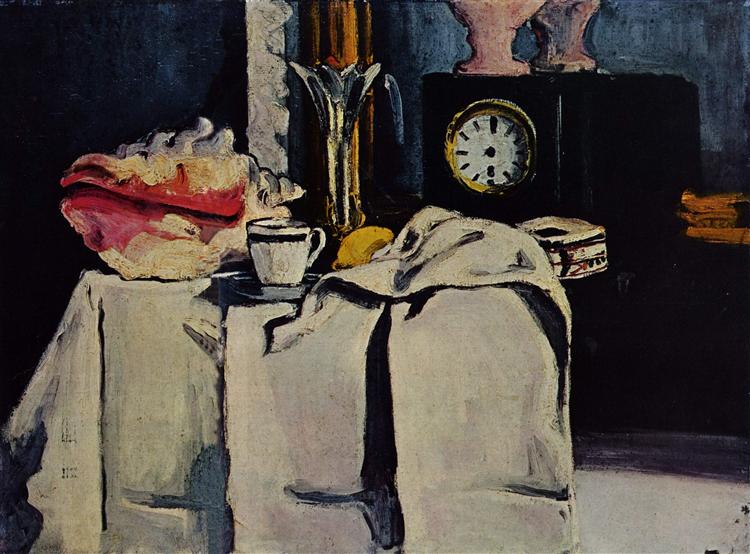
The Black Marble Clock (1869) – Paul Cezanne
And yet other objects in the piece speak to lighter elements of human experience. An enormous pink seashell, a vase. The brightness that emanates from the simple tablecloth and napkin. Under the watchful eye of the eponymous clock, it seems that there is still time for ease and pleasure. At least for the time being.
14. Christmas Morning, Breakfast (1945) – Horace Pippin
After all of the forbidding images and subversive messages about the passage of time and the nature of clocks, we thought it fitting to end with a sweet and simple image of a clock in a homey domestic setting.
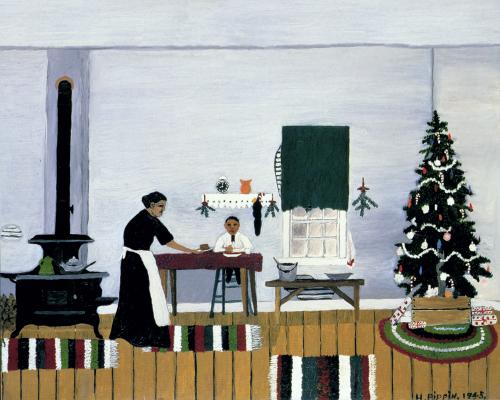
Christmas Morning, Breakfast (1945) – Horace Pippin
Breakfast on Christmas Morning by Horace Pippin channels one of the most beautiful elements of time and timekeeping: the joy of anticipation. Seeing this reminded us of waking up at 4:00A on Christmas morning, and being admonished by our parents not to get up until at least 6:00A. Those couple of hours might have been the best of the day, in retrospect. What could be better than being suspended in time, surrounded by loved ones, and certain that something wonderful is only minutes away?
In this work, the clock becomes a friend and accomplice. The seconds ticking away bring us ever closer to a wonderful experience.
world famous paintings and works of art about the passage of time and clocks
That’s it – a collection of world famous paintings and works of art featuring clocks, timepieces and meditations on the passage of time. Perfect to view on NYE, a birthday or an important anniversary. Clocks have metaphoric layers and depth; a simple object can illuminate so much about our human experience.
Which ones speak to you, dear reader?
